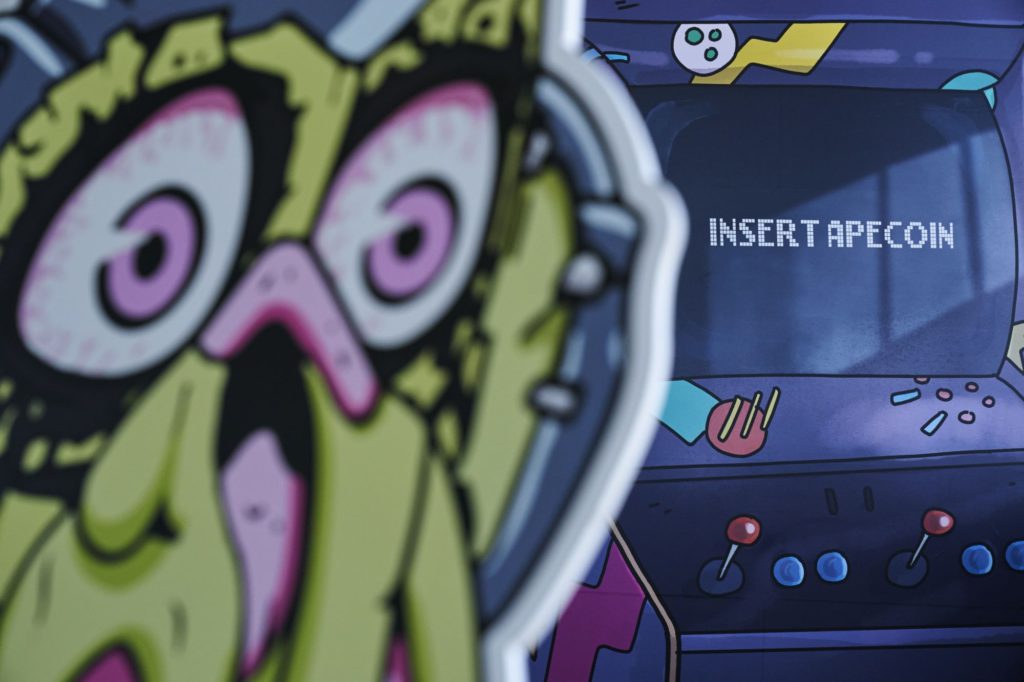(Bloomberg) — Yuga Labs, the creator of the popular Bored Apes Yacht Club collection of NFTs, is seeking to refund transaction fees incurred by bidders who were unsuccessful at its weekend auction of virtual land related to its metaverse project.
The record sale raised around $320 million but also resulted in about $180 million transaction fees in Ether. The frenzy caused the congestion on the Ethereum blockchain with the so-called gas fees so high that not only the minters but other Ethereum-based apps users were unable to perform many activities such as trading or minting. In order to complete a transaction on the network, extra fees are needed to prioritized the transaction given limited capacity of Ethereum blockchain.
Yuga Labs declined to comment beyond its tweet to disclose more details such as the amount for the refund and the number of affected minters.
The saga is the latest example of a popular Ethereum-based NFT launch causing congestion and high fees on Ethereum. While the network is about to undergo one of its most significant technical upgrades this year, it doesn’t address scalability issues and fees. Developers have been working on a few scaling solutions such as so-called layer 2 projects and sharding that changes the way to distribute data but similar congestion issues have persisted.
It appears that winning bidders on the virtual land rushed to the secondary NFT marketplace OpenSea to flip the assets for a quick profit. OpenSea’s daily sales on May 1 were more than four times higher than the prior day, according to data from Dune Analytics.
Holders of the ApeCoin token who verified their identities jockeyed to buy deeds for 55,000 parcels of virtual land in Otherside, the project’s planned metaverse game and the latest extension of the Bored Ape franchise. Anticipation that interest would be strong for the plots — Ethereum-based NFTs called Otherdeeds — had pushed up the price of ApeCoin last week ahead of the sale. The price fell about 16% to $14.64 over the last 24 hours, according to CoinMarketCap data.
Each plot cost a buyer around $5,800 based on ApeCoin’s price of $19 at the time of the auction, plus the gas fees.
Minting a token or making a transaction on Ethereum requires token creators or traders to pay a fee to those that order transactions on the network. Transaction fees go higher when the network becomes congested given more fees are needed to prioritize a transaction. That can impact the Ethereum-based business of apps like Uniswap, effectively slowing the transactions on these other platforms.
Yuga Labs apologized on Twitter for “turning off the light on Ethereum,” and suggested the possibility of establishing an ApeCoin blockchain.
The ApeCoins raised in the sale will be locked up — meaning that they can’t be sold, thus reducing coins in circulation — for one year, according to Otherside’s Twitter account.
Besides the 55,000 Otherdeeds sold Saturday, another 45,000 were allocated to holders of Bored Ape Yacht Club and Mutant Ape NFTs, as well as Yuga Labs and other project developers, with another 100,000 of the tokens expected to be awarded later to certain Otherdeed holders, according to the Otherside website.
ApeCoin is striving to become widely used in a variety of so-called web3 apps, using digital coins and blockchains. The idea is for owners to be able to access a variety of events, services, merchandise and games. It’s also the governance token of ApeCoin DAO, whose board includes Reddit Co-founder Alexis Ohanian and FTX’s Amy Wu.
Venture capital investors that helped with ApeCoin’s March launch, including Andreessen Horowitz and Animoca, were some of the biggest recipients of ApeCoin, which was created as an “airdrop,” in which certain groups of crypto holders automatically received 1 billion tokens as a reward. They and other launch partners received 14%, or 140 million tokens.
More stories like this are available on bloomberg.com
©2022 Bloomberg L.P.











